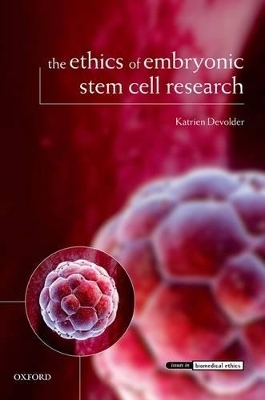
The Ethics of Embryonic Stem Cell Research
Oxford University Press (Verlag)
978-0-19-954799-9 (ISBN)
Embryonic stem cell research holds unique promise for developing therapies for currently incurable diseases and conditions, and for important biomedical research. However, the process through which embryonic stem cells are obtained involves the destruction of early human embryos. Katrien Devolder focuses on the tension between the popular view that an embryo should never be deliberately harmed or destroyed, and the view that embryonic stem cell research, because of its enormous promise, must go forward. She provides an in-depth ethical analysis of the major philosophical and political attempts to resolve this tension. One such attempt involves the development of a middle ground position, which accepts only types or aspects of embryonic stem cell research deemed compatible with the view that the embryo has a significant moral status. An example is the position that it can be permissible to derive stem cells from embryos left over from in vitro fertilisation but not from embryos created for research. Others have advocated a technical solution. Several techniques have been proposed for deriving embryonic stem cells, or their functional equivalents, without harming embryos. An example is the induced pluripotent stem cell technique. Through highlighting inconsistencies in the arguments for these positions, Devolder argues that the central tension in the embryonic stem cell debate remains unresolved. This conclusion has important implications for the stem cell debate, as well as for policies inspired by this debate.
Katrien Devolder obtained a PhD in Philosophy at Ghent University in 2006, after which she was awarded a six-year Postdoctoral Research Fellowship by the Research Foundation Flanders. She conducted her postdoctoral work at the Bioethics Institute Ghent, Department of Philosophy and Moral Sciences, at Ghent University, as well as during long-term academic visits at several other universities, including the University of Oxford, Harvard University, and Princeton University. Between 2012 and 2014 she worked as an Assistant Professor at Ghent University, and from October 2014 onwards, she will be a Marie Curie Fellow at the Oxford Uehiro Centre for Practical Ethics, Faculty of Philosophy, University of Oxford.
1. Introduction: The Ethics of Embryonic Stem Cell Research ; 2. The Discarded-Created Distinction ; 3. The Use-Derivation Distinction ; 4. Technical Solutions ; 5. Compromise and Consistency ; Bibliography ; Index
| Reihe/Serie | Issues in Biomedical Ethics |
|---|---|
| Verlagsort | Oxford |
| Sprache | englisch |
| Maße | 147 x 222 mm |
| Gewicht | 346 g |
| Themenwelt | Geisteswissenschaften ► Philosophie ► Ethik |
| Medizin / Pharmazie ► Medizinische Fachgebiete ► Medizinethik | |
| Studium ► Querschnittsbereiche ► Geschichte / Ethik der Medizin | |
| Naturwissenschaften ► Biologie | |
| Sozialwissenschaften ► Soziologie | |
| Technik ► Umwelttechnik / Biotechnologie | |
| ISBN-10 | 0-19-954799-8 / 0199547998 |
| ISBN-13 | 978-0-19-954799-9 / 9780199547999 |
| Zustand | Neuware |
| Haben Sie eine Frage zum Produkt? |
aus dem Bereich


